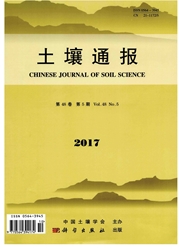

 中文摘要:
中文摘要:
集约经营的雷竹有很高的经济效益,然而长期种植的雷竹林土壤酸化严重,影响了雷竹的可持续经营。研究通过采集浙江临安两样地不同雷竹种植年限的土壤,分析土壤酸化指标,以了解雷竹集约种植下土壤的酸化过程。结果表明,随种植年限的增加,土壤氮磷钾养分积累明显,而pH值下降显著。土壤中交换性酸随时间显著增加,其中交换性铝的比例也在增加,而盐基阳离子及饱和度下降明显。通过简单的方程拟合可以知道不同地点土壤酸化速率有所差异,但最终pH值较为相同,说明强度人为经营措施对土壤性质影响显著。因此,要防治雷竹土壤的酸化需要进行合理有效的管理措施。
 英文摘要:
英文摘要:
Lei bamboo(Phyllostachys praecox.) plantati on with intensive management has high economic profit;however,long-term plantation of it can cause the soil in severe acidification and finally influences its sustainability in practical.In this study,soils of two sites with different bamboo plantation time were collected from Linan,Zhejiang Province to clarify bamboo soil acidification through analysis of soil acidification indicators.Results showed that soil NPK nutrients accumulated obviously with the bamboo plantation,but soil pH dropped greatly.Soil exchangeable acid increased with the bamboo planting time,so was the proportion of exchangeable Al.However,the exchangeable base cation and its saturation dropped greatly.With the simple simulation of the first order decay equation,it was found that the soil acidification differed with soil site but the final pH was similar,which suggesting that the effect of intensive management exerted an important effect on soil properties.Therefore,it is important to adopt reasonable and effective measures to control soil acidification caused by bamboo plantation for its sustainability in practical.
 同期刊论文项目
同期刊论文项目
 同项目期刊论文
同项目期刊论文
 Iron and aluminum forms of the soil in Moso-bamboo stands under the extensive and integrated culture
Iron and aluminum forms of the soil in Moso-bamboo stands under the extensive and integrated culture Changes of soil aluminum form after a bamboo planted on a paddy soil soil with an intensive manageme
Changes of soil aluminum form after a bamboo planted on a paddy soil soil with an intensive manageme 期刊信息
期刊信息
